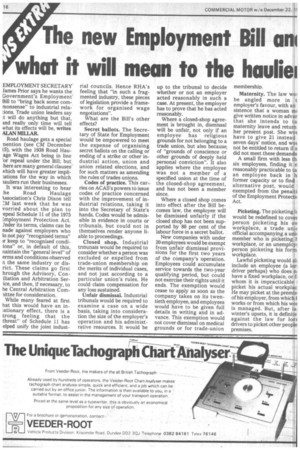The new Employment Bill am what it will mean to the hauliel
Page 18

If you've noticed an error in this article please click here to report it so we can fix it.
EMPLOYMENT SECRETARY James Prior says he wants the Government's Employment Bill to "bring back some commonsense" to industrial rela:ions. Trade union leaders say .t will do anything but that, lnd really only time will tell what its effects will be, writes AN MILLAR.
Road haulage gets a special nention (see CM December 15), with the 1938 Road Hauage Wages Act being in line 'or repeal under the Bill; but .here are many general clauses which will have greater implis„ations for the way in which lauliers run their businesses.
It was interesting to hear he Road Haulage #ssociation's Chris Dixon tell 3M last week that he was worried about the plan to .epeal Schedule 11 of the 1975 :mployment Protection Act, Jnder its terms, claims can be nade against employers who lo not pay "recognised terms" )1keep to "recognised condiions" or, in default of this, naintain the "general level" of erms and conditions observed ri the same industry or disrict. These claims go first hrough the Advisory, Coniliation and Arbitration Serice, and then, if necessary, to he Central Arbitration Com*tee for consideration.
While many feared at first hat this would have an in.ationary effect, there is a trong feeling that the threat" of Schedule 11 has elped unify the joint indust rial councils. Hence RHA's feeling that "in such a fragmented industry, these pieces of legislation provide a framework for organised wage negotiations".
What are the Bill's other effects?
Secret ballots. The Secretary of State for Employment would be empowered to meet the expense of organising secret ballots on the calling of ending of a strike or other industrial action, union and union related elections, and for such matters as amending the rules of trades unions.
Codes of practice. This car-, ries on ACAS's powers to issue codes of practice concerned with the improvement of industrial relations, taking it into the Secretary of State's hands. Codes would be admissible in evidence in courts or tribunals, but could not in themselves render anyone liable to proceedings.
Closed shop. Industrial tnbunals would be required to consider whether a person was excluded or expelled from trade-union membership on the merits of individual cases, and not just according to a particular union's rules. He could claim compensation for any loss sustained.
Unfair dismissal. Industrial tribunals would be required to examine a case on a wide basis, taking into consideration the size of the employer's operation and his administrative resources. It would be up to the tribunal to decide whether or not an employer acted reasonably in such a case. At present, the employer has to prove that he has acted reasonably.
Where a closed-shop agreement is brought in, dismissal will be unfair, not only if an employee has religious grounds for not belonging to a trade union, but also because, of "grounds of conscience or other grounds of deeply held personal conviction". It also 'applies where the employee was not a member of a specified union at the time of the closed-shop agreement, and has not been a member since.
Where a closed shop comes into effect after the Bill becomes law, the employee will be dismissed unfairly if the closed shop has not been supported by 80 per cent of the labour force in a secret ballot.
New companies with under 20 employees would be exempt from unfair dismissal provisions for the first two years of the company's operation. Employees could accumulate service towards the two-year qualifying period, but could not exercise their rights until it ends. The exemption would cease to apply as soon as the company takes on its twentieth employee, and employees would have to be given full details in writing and in advance. This exemption would not cover dismissal on medical grounds or for trade-union membership.
Maternity. The law woi be angled more in t employer's favour, with an sistence that a woman mi give written notice in advan that she intends to ta maternity leave and return her present post. She wpi, have to give 21 instead seven days' notice, and wtn not be entitled to return if s did not meet these demands A small firm with less th six employees, finding it n reasonably practicable to ta an employee back in h former capacity or to find alternative post, would I exempted from the penalti of the Employment Protect( Act.
Picketing. The picketing k would be redefined to COM person picketing his Qv workplace, a trade uni( official accompanying a unit member who is picketing t workplace, or an unemployi • person picketing his form workplace.
Lawful picketing would all include an employee (a Ion driver perhaps) who does n, have a fixed workplace, or fi whom it is impracticable 1 picket his actual workplac He may picket at the premisi of his employer, from which I works or from which his wtli is managed. But, after la: winter's upsets, it is definitel against the law for Ion drivers to picket other people premises.




















































































